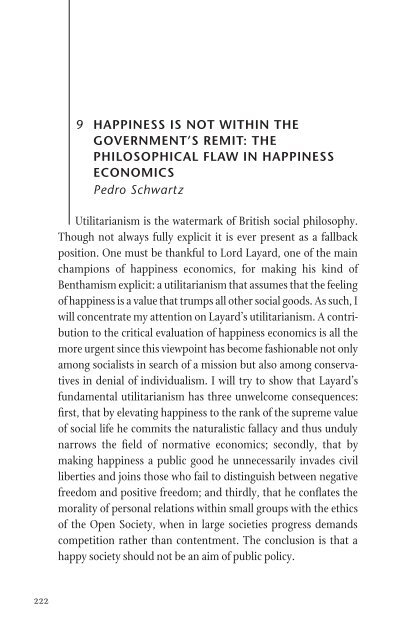… and the Pursuit of Happiness - Institute of Economic Affairs
… and the Pursuit of Happiness - Institute of Economic Affairs
… and the Pursuit of Happiness - Institute of Economic Affairs
Create successful ePaper yourself
Turn your PDF publications into a flip-book with our unique Google optimized e-Paper software.
happiness is not within <strong>the</strong> government’s remit<br />
9 <strong>Happiness</strong> is not within <strong>the</strong><br />
government’s remit: <strong>the</strong><br />
philosophical flaw in happiness<br />
economics<br />
Pedro Schwartz<br />
Utilitarianism is <strong>the</strong> watermark <strong>of</strong> British social philosophy.<br />
Though not always fully explicit it is ever present as a fallback<br />
position. One must be thankful to Lord Layard, one <strong>of</strong> <strong>the</strong> main<br />
champions <strong>of</strong> happiness economics, for making his kind <strong>of</strong><br />
Benthamism explicit: a utilitarianism that assumes that <strong>the</strong> feeling<br />
<strong>of</strong> happiness is a value that trumps all o<strong>the</strong>r social goods. As such, I<br />
will concentrate my attention on Layard’s utilitarianism. A contribution<br />
to <strong>the</strong> critical evaluation <strong>of</strong> happiness economics is all <strong>the</strong><br />
more urgent since this viewpoint has become fashionable not only<br />
among socialists in search <strong>of</strong> a mission but also among conservatives<br />
in denial <strong>of</strong> individualism. I will try to show that Layard’s<br />
fundamental utilitarianism has three unwelcome consequences:<br />
first, that by elevating happiness to <strong>the</strong> rank <strong>of</strong> <strong>the</strong> supreme value<br />
<strong>of</strong> social life he commits <strong>the</strong> naturalistic fallacy <strong>and</strong> thus unduly<br />
narrows <strong>the</strong> field <strong>of</strong> normative economics; secondly, that by<br />
making happiness a public good he unnecessarily invades civil<br />
liberties <strong>and</strong> joins those who fail to distinguish between negative<br />
freedom <strong>and</strong> positive freedom; <strong>and</strong> thirdly, that he conflates <strong>the</strong><br />
morality <strong>of</strong> personal relations within small groups with <strong>the</strong> ethics<br />
<strong>of</strong> <strong>the</strong> Open Society, when in large societies progress dem<strong>and</strong>s<br />
competition ra<strong>the</strong>r than contentment. The conclusion is that a<br />
happy society should not be an aim <strong>of</strong> public policy.<br />
Layard’s utilitarianism<br />
In <strong>the</strong> third <strong>of</strong> his Robbins Memorial Lectures (2003), Layard<br />
defends <strong>the</strong> need for a comprehensive moral <strong>the</strong>ory to guide us<br />
in everyday life <strong>and</strong> in situations <strong>of</strong> moral difficulty. He points<br />
out something that is true, namely that today ‘<strong>the</strong>re are no agreed<br />
concepts <strong>of</strong> how unselfish a person should be or <strong>of</strong> what constitutes<br />
a good society’; but he assumes that <strong>the</strong> good society needs<br />
a unifying moral <strong>the</strong>ory, something which is arguable, to say <strong>the</strong><br />
least. He notes that present-day philosophers <strong>of</strong>fer no overarching<br />
<strong>the</strong>ory that would help us to resolve all our moral dilemmas.<br />
Instead, he says, <strong>the</strong>y support various separate values: ‘promisekeeping,<br />
kindness, truthfulness, fairness <strong>and</strong> so on’. To fill <strong>the</strong><br />
need for a unifying principle <strong>of</strong> personal <strong>and</strong> social morality he<br />
proposes Bentham’s classical utilitarianism. As he says: ‘I want<br />
to suggest that <strong>the</strong> right concept is <strong>the</strong> old Enlightenment one <strong>of</strong><br />
<strong>the</strong> greatest happiness. The good society is <strong>the</strong> one where people<br />
are happiest. And <strong>the</strong> right action is <strong>the</strong> one which produces <strong>the</strong><br />
greatest happiness’ (ibid.).<br />
Lord Layard thus bases his happiness economics on a<br />
Benthamite foundation: in our societies we should not value<br />
productive efficiency or economic growth or individual liberty<br />
in <strong>the</strong>mselves but should seek to maximise <strong>the</strong> overall amount <strong>of</strong><br />
happiness. 1 The negative externalities <strong>of</strong> rivalrous behaviour <strong>and</strong><br />
1 Layard seems to be unaware in his Robbins Lectures (2003) <strong>of</strong> <strong>the</strong> fact that utilitarianism<br />
at <strong>the</strong> present time has come in for heavy criticism by many authors who<br />
are as keen as he is for government to display active public policies in <strong>the</strong> promotion<br />
<strong>of</strong> <strong>the</strong> good society. He only mentions Sen’s strictures on mere addition <strong>of</strong><br />
individual happiness in Lecture III, when Sen’s capability approach (1999) goes<br />
far beyond classical utilitarianism, to say nothing <strong>of</strong> Rawls’s dem<strong>and</strong> that in <strong>the</strong><br />
good society a minimum <strong>of</strong> <strong>the</strong> all-purpose means (including income <strong>and</strong> wealth)<br />
that individuals need to pursue <strong>the</strong>ir interests <strong>and</strong> to maintain <strong>the</strong>ir self-respect<br />
as free <strong>and</strong> equal persons should be supplied (1999).<br />
222<br />
223












